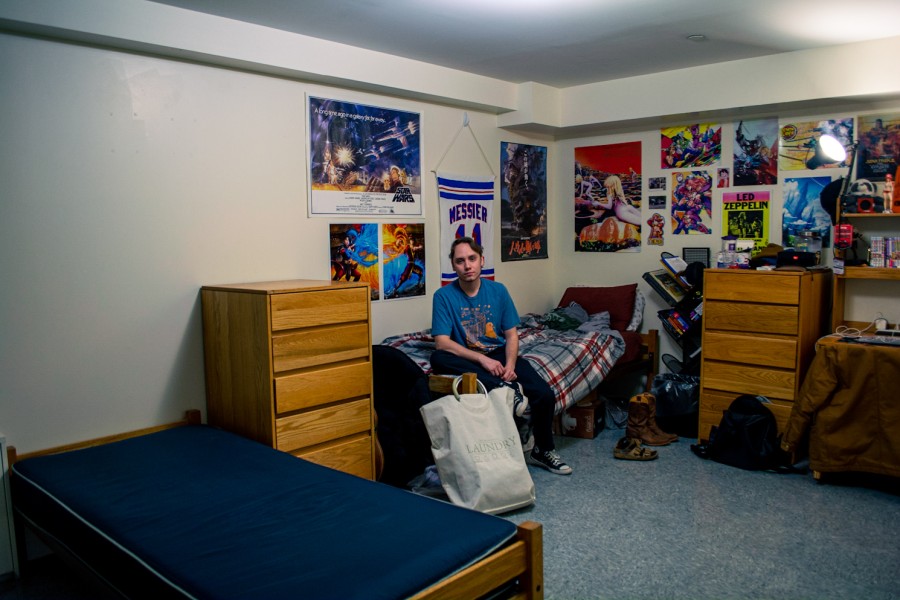Students upset by NYU response to roommate’s mental health crisis
Coral Tower residents sought a dialogue with their residence hall directors to communicate their concerns. They were left in the dark instead.
Mac Breazzano’s room now contains an empty bed. (Staff Photo by Manasa Gudavalli)
April 18, 2022
Content warning: This article contains descriptions of a mental health crisis.
Five residents of a Coral Tower suite said the building directors refused to listen to their concerns about their roommate after he had a mental health crisis.
The student’s roommates — Mac Breazzano, Nikhil Chirumamilla, Daylon Fernandez and two other sophomores — noticed that he was acting out of character starting late January. The student is referred to anonymously with his permission. He declined to be interviewed.
During the early morning of Feb. 7, he was found wandering the halls of Coral Tower carrying kitchen knives and cutlery. His roommates said they later found a large knife hidden in a kitchen cabinet. They said Campus Safety officers told them the student was in a state of psychosis. He did not return to the room until about two weeks later.
Following the incident, the roommates said they were concerned for him, but they were also concerned for their own safety. They repeatedly requested to speak with Coral Tower administration, but Residence Hall Director Bret Beaufeaux and Assistant Director Danielle Berkman told them that they could not discuss details of the student’s case.
After mental health crisis, housing directors failed to communicate
A few weeks into the spring 2022 semester, the student started to pace in the common area of the dorm room late at night and break into outbursts of yelling and cursing. His roommates worried that he was homesick or struggling academically.
After he was confronted in Coral Tower on Feb. 7, the student told Campus Safety officers that he believed his roommates were planning to kill him. That afternoon, the roommates received calls from NYU’s Counseling and Wellness Services in accordance with university policy.
“It just seemed like they were calling us because they had to,” Fernandez said.
Breazzano, who shared a bedroom with the student, also received a call from Beaufeaux that day. He said Beaufeaux provided his personal phone number as a resource, but did not pick up or return Breazzano’s calls in the following weeks.
“He never talked to us,” one roommate said regarding Beaufeaux. “He never tried to find out what actually happened, and nobody tried to get our side of the story.”
When he tried to contact Beaufeaux, Breazzano said he only received responses from Berkman. She said that the student was safe, but that she was unable to provide further details. Disclosing information about the student would violate privacy regulations.
Beaufeaux declined WSN’s request for comment. He also said he was unable to discuss the mental health crisis due to the Family Educational Rights and Privacy Act, a federal law that protects student records. Berkman did not respond to multiple requests for comment.
The roommates started locking their bedroom doors at night. They continued asking Coral Tower administrators if the student was allowed to return to the room and if they would be informed beforehand.
“We want him to be OK, but we don’t want him to come back here because it was very traumatizing,” Breazzano said.
On Feb. 23, a friend told Breazzano that the student was in the lobby of the building. Breazzano was shaken and called Beaufeaux, who did not pick up.
Less than an hour later, the student and his friend entered the suite. The roommates said he was acting like he was before the crisis, but they were still uncomfortable with him returning unaccompanied by a member of the residence hall staff. Breazzano said they had previously been reassured by residence hall staff that they would be notified before the student returned.
NYU spokesperson Shonna Keogan wrote in a statement to WSN that, according to university policy, a student returning from a hospital or other off-site mental health facility must be assessed by the Wellness Exchange before returning to campus buildings. After an assessment, building staff are always notified if the student is permitted to re-enter the building, but they are not told when the student will return.
When Berkman responded on behalf of Beaufeaux later that day, she said she was not notified that the student was returning, but she said that he had been cleared by the Wellness Exchange.
Roommates repeatedly refuse housing relocation
Berkman told Breazanno that the residence hall staff could not prevent the student from returning. She offered him a temporary room assignment, which he declined.
“He’s one guy — you’d rather move five of us?” Breazzano said. “That doesn’t make sense.”
According to Chirumamilla and Fernandez, the student had spoken to a residence assistant before Feb. 7 and said he was interested in a room change. After his mental health crisis, Coral Tower administrators offered room changes for the five other roommates as per university policy.
Beaufeaux left a voicemail for Breazzano on Feb. 25 — the first time Breazzano had heard from him since Feb. 7. Beaufeaux said he had been working on providing Breazzano with a temporary room change, an option that Breazzano had declined two days prior.
“None of us asked for it, and [Beaufeaux] literally called me and was like, ‘Yeah, we’re doing it,’” Breazzano said.
Voicemail
Date: Feb. 25, 2022 at 5:17 p.m.
From: Bret Beaufeaux
To: Mac Breazzano
Hi, this message is for Mac. This is Bret Beaufeaux, the Residence Hall Director for Coral. I’m just calling to follow up to the conversation that you had with Danielle earlier, and just to let you know that a colleague of mine, as we’re out for the rest of the weekend, will be in touch with you tonight about moving forward pursuing a temporary room change for you.
So the temporary room change is being offered given the safety concerns that you have presented to us and we’ve been advocating for the temporary room change for you. So again, a colleague of mine will be in touch with you about instructions for that, setting it up, and then we can touch base next week. Alright, thank you and have a good weekend.
Breazanno said he made several phone calls over the span of four weeks to Beaufeaux, but the director never answered or returned his calls. Breazzano believed Beaufeaux was only reaching out in order to pressure him to move.
“I’m like, ‘They really are trying to force me to move as opposed to talking or helping us,’” Breazzano said. “We’ve gotten no assistance, no dialogue, no nothing, and that’s what is upsetting the most.”
Roommate leaves after weeks of silence
Breazzano said a series of emails in late February convinced him of NYU’s unwillingness to communicate. On Feb. 25, Breazzano wrote an email to Beaufeaux, Berkman and four other NYU administrators in the Residential Life and Housing Services and Campus Safety departments.
In the email thread, Breazzano attempted again to initiate a dialogue with Beaufeaux and Berkman on behalf of his suitemates. He recounted the events that made him feel unsafe and explained why he felt unheard. He also requested an in-person meeting between the roommates and the residence hall directors.
“I am writing this email in the hopes that NYU will do something for the benefit of our safety, as well as [the student’s],” Breazzano wrote in the email. “We want him to receive the care and help he needs, but we are unequipped to handle such a situation, and we are still shaken up from the incident.”
David Lopez, the incident response manager of the Residential Life and Housing Services Incident Response Team, responded the next day and offered to meet with Breazzano and his roommates that weekend. The roommates expressed gratitude for his response, but they reiterated their request to meet with the residence hall directors directly.
They proposed a meeting time of 5 p.m. on Monday, Feb. 28. At 4:16 p.m. that Monday, Beaufeaux responded. Citing FERPA, he wrote that he was unable to meet with the roommates. Beaufeaux referred the roommates to the Wellness Exchange and Campus Safety, and again offered assistance with permanent or temporary room changes.
“Given that we are not able to share any additional information beyond what has already been shared in this response, we will not be scheduling a meeting to further discuss this matter,” Beaufeaux wrote in the email.
Subject: Re: Residential Incident in Coral Towers
Date: Feb. 28, 2022 at 4:16 p.m.
From: Bret Beaufeaux
Hi everyone,
Thank you for your continued outreach. We certainly hear your concern. At the present time we are working to address this issue, but are not able to share any information beyond that with you. This is not to be deliberately evasive, but comes from our ethical and legal responsibility to every student’s right to privacy. This is how all university information and records are handled per the Federal Education Rights and Privacy Act [sic].
While we recognize this is a challenging situation that has been disruptive to your living environment, we are able to connect you with NYU Wellness for you to process your experience confidentially. Moreover, you are also able to connect 24/7 with NYU Campus Safety to report any immediate concerns that you may experience. If you would like to explore permanent or temporary room changes, we would be able to assist you with that matter.
You have indicated that you may involve the New York Police Department, which is within your rights. We are not able to stop you from filing a police report with the NYPD.
If we are able to provide you with any additional information or resources beyond what has been provided, a member of our team will certainly be in touch with you. Given that we are not able to share any additional information beyond what has already been shared in this response, we will not be scheduling a meeting to further discuss this matter.
Thank you,
Bret
Keogan said that residence hall staff typically do meet with students who are experiencing similar housing situations.
“Other students — roommates, classmates, dorm mates — have a reasonable expectation that NYU will act in ways that will keep them safe,” Keogan wrote. “We attempt to carefully balance these demands, including offering appropriate academic and housing accommodations.”
On March 9, Beaufeaux repeated his offer to move the roommates to another room, either temporarily or permanently. Fernandez said Beaufeaux’s second message was “the same exact email, essentially, just reworded,” and said it felt insulting.
“We don’t want it — we told [him] that so many times,” Fernandez said. “We’ve been constantly saying this is not what we want, and they still just press it on us.”
Subject: Re: Residential Incident in Coral Towers
Date: March 9, 2022 at 11:23 a.m.
From: Bret Beaufeaux
Hello again,
I am writing to inform you that while we do not have any information to provide you, we are able to make room permanent or temporary room change requests should you feel you need one. If you would like to make a request for a permanent or temporary room change, please reply to this email with that request.
In addition, I would like to reiterate that NYU Wellness is available 24/7 should you feel you need to process confidentially. As I noted in my previous communication, you may also contact NYU Campus Safety to report any urgent concerns that you may have.
Again, while we are not able to share information or discuss this situation with you, I want to reiterate that we are here to support you through means available by offering permanent or temporary room changes, connecting you with Wellness, and ensuring that you are able to connect with NYU Campus Safety to report any concerns.
Thank you,
Bret
Berkman broke what the roommates described as weeks of radio silence on March 23. In an email, she notified them that she would be accompanying the student to the room to collect his belongings.
Later that day, Berkman, the student and his mother arrived at the suite. Berkman accompanied them to the dorm and waited in the doorway. Breazzano said that he talked with the student for about an hour about his plans to return home and take a gap year. The student and his mother packed his belongings and left.
Concerns about communication in the future

Although the roommates have not spoken with the student since he moved, they said they wish him well. Mac Breazzano’s father, Jim Breazzano, also emphasized his concern for the student.
“Regardless of how NYU did, the bottom line is — we want the kid to get better,” Jim Breazzano said. “We don’t want to ostracize him, out him, hurt him, punish him.”
Jim Breazzano said that, given the university’s large student body, it was likely that the situation would be neither the first nor the last time that affected students had felt unheard following a mental health crisis.
“I’m sure someone’s going to hear this and be like, ‘Yeah, that happened to us, but nobody did anything about it,’ and NYU blew them off too,” Jim Breazzano said.
Mac Breazzano and his roommates said that the measures they were asking for — communication regarding their safety concerns — was never in conflict with Beaufeaux and Berman’s obligation to protect the student’s privacy. The roommates said they only wanted to talk, even if the residence hall staff could not answer all of their questions.
“Nobody had a conversation with these kids,” Jim Breazzano said. “When Mac wrote a letter to the powers that be, they basically chose to ignore him. It wasn’t a conversation about [the student’s] health — it was a conversation about their well-being, their safety.”
Contact Alex Tey at [email protected].




























































































































































